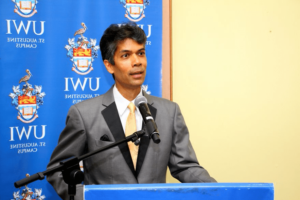‘Caribbean people need to adopt strategies such as petitions and marches to discourage the foreign media from continuing its onslaught’

THE media includes a diverse range of sources– television, DVDs, CDs, newspaper, magazines, comics, cinema, radio and the internet. Undoubtedly, some of the significant components of society’s expectations of men are solidly rooted in the media.
Likewise, Caribbean men behave in a certain manner and contribute to social problems due to improper socialisation by an omnipresent United States (US) media.
The US media has created a cultural dependency in the Caribbean. This dependency implies that Caribbean people reject their local or indigenous culture and accept or favour the US culture.
The acculturation process spearheaded by the US media has been so successful that Caribbean men have lost their identity. Indeed, many Caribbean societies can be easily mistaken for a “little United States.”
Prior to 2000, the men’s movements have largely been based on experiences of non-white men. This has contributed to the absence of a unique, multicultural, multiracial Caribbean men’s movement which would deal with social problems facing males.
The religious and conservative voices in the Caribbean are numerically small and thus unable to resist and boycott the powerful movie industry. Many Caribbean citizens do not understand the repercussions which this foreign culture has on the psychological development of the region’s youths.

There is a need for solidarity among interest groups and individuals desiring to radically transform the stereotyped male.
Caribbean people need to adopt strategies such as petitions and marches to discourage the foreign media from continuing its onslaught.
Undoubtedly, a serious boycott will be a wake-up call for the media and at least ensure there is some improvement.
Ignoring the shortcomings of the media will certainly lead to disaster for the next generation. Only when men are portrayed in the media as capable of being honest, decent, morally upright, possessing morals and displaying integrity, then Caribbean citizens can hope to progress.
Even in the United States, the upright and level-headed citizens cannot boast that the US media promotes traditional family values and wholesome entertainment.

Accusations against the US media as cold and inhumane are justified when one understands the irreversible damage as a result of distorted portrayals of men and negative influences being entrenched in the psyche of women.
Unfortunately, the US media is an influential medium in which millions of men in the Caribbean come into contact on a daily basis. Foreign value systems have infiltrated the region and have been subtly imposed on the Caribbean. For instance, advertisements at bus-stops, on walls, in the electronic media give Caribbean society the impression that drinking a particular brand of alcohol, smoking a special type of cigarette, driving a new car or wearing some fashionable clothes automatically ensure that a man will win friends and attract slim, beautiful women. Another popular illustration is the use of male athletes to advertise sports gear such as running shoes. Why not use these athletes to promote literacy or the significance of education?
West Indians are familiar with ads which continuously bombard them with subliminal messages. The men in these ads are well- dressed, manicured, sometimes with bulging biceps, surrounded by attractive women and marketed as the ideal man in today’s world.
It is unfortunate that often the media do not bother to depict another side of the story—the tragic reality of thousands of men who slowly suffer from smoking-related diseases. The public seem apathetic and oblivious to the drunkards who are violently killed and injure innocent persons in car accidents. The question that is difficult to answer- is the media with its advertisements created a shallow and superficial man who is materialistic, narcissistic and hedonistic?

Obviously, the tobacco, alcohol, song and television companies are concerned solely with profits and not the welfare of the consumers and the impact of an abuse of their products on society.
Defenders of the media might argue that movies and television shows are part of the culture or a work of art. Then it seems that there is a very thin line which separates entertainment and cultural rubbish. The suggestive antics of gyrating artistes in music videos or the sexual escapades graphically exposed in the tabloids, send the wrong messages to West Indian teenagers.
Additionally, it is not surprise that those who promote degrading songs and derogatory music videos usually win awards and become chartbusters.
Dr Jerome Teelucksingh is an activist. He initiated the inaugural observances of International Day for the Elimination of Violence Against Men and Boys (January 31) and World Day of the Boy Child (May 16). He has made academic presentations at tertiary institutions including Harvard University and Oxford University.
See other articles by Dr Jerome Teelucksingh on AZP News:
Bloodless Revolution to Save Lives in Developing Countries
The Need for a Social and Moral Revolution
The Law of Supply and Demand in Developing Countries
End the Dependency for Developing Countries
T&T Carnival and the Emperor’s New Clothes
The Influence of Labour on Caribbean Integration
The illusion of political Unity
Presbyterians in Trinidad: Humble Missionaries, Local Workers
Religious Plurality: Curse or Blessing
Caribbean Youth Need Optimism, Patriotism
Rethinking Identities in Caribbean, Latin America
November 19: All Inclusive International Men’s Day
Should International Agencies be Blamed for Unemployment
A Need to Observe Word Unemployment Day
An Ideology for the Trade Union Movement
The Man who Couldn’t be Prime Minister
Social Outburst vs Social Revolution
Challenges of the Men’s Movement
If George Floyd was Denied Parole
The Meaning of Indian Arrival Day in T&T
International Men’s Day – A Way of Life
Wounds that cause school violence
May Day: A Time for Solidarity, Strength
Who Coined the Term ‘Black Power’
The illusion of political Unity
Presbyterians in Trinidad: Humble Missionaries, Local Workers
Religious Plurality: Curse or Blessing
Caribbean Youth Need Optimism, Patriotism
Rethinking Identities in Caribbean, Latin America
November 19: All Inclusive International Men’s Day
Should International Agencies be Blamed for Unemployment
A Need to Observe Word Unemployment Day
An Ideology for the Trade Union Movement
The Man who Couldn’t be Prime Minister
Social Outburst vs Social Revolution
Challenges of the Men’s Movement
If George Floyd was Denied Parole
The Meaning of Indian Arrival Day in T&T
International Men’s Day – A Way of Life
Wounds that cause school violence
May Day: A Time for Solidarity, Strength
Who Coined the Term ‘Black Power’
![]()










